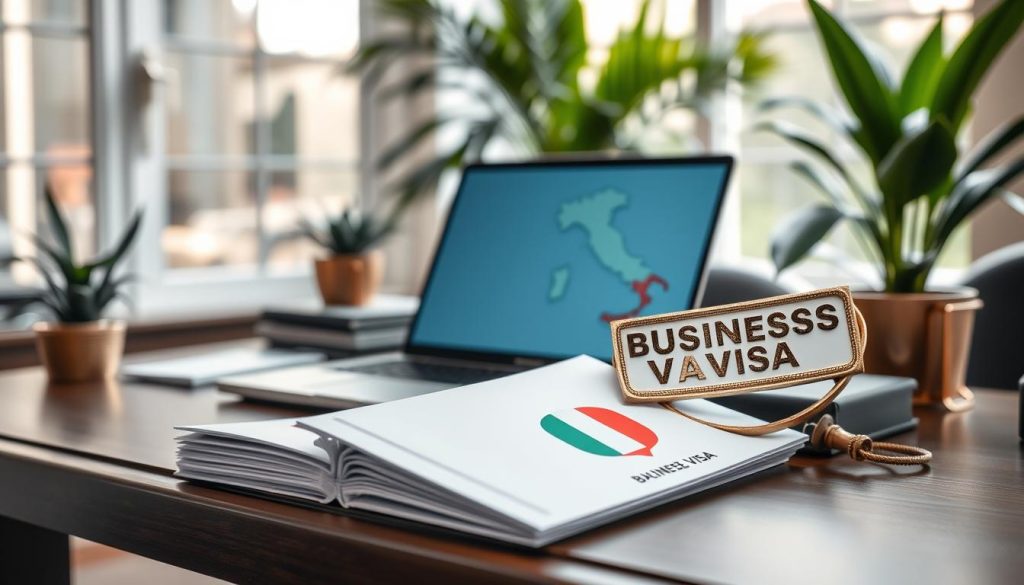Starting a small business in Italy as an American comes with its own set of challenges and chances. The Italian business scene is full of variety, offering many paths for American entrepreneurs. It’s important to know the rules, cultural differences, and economic trends to succeed.
For those ready, Italy can be a great place to start and grow a business. The cost of starting a business for foreigners can change a lot. It can be as high as €5,650 in the first year or €1,850 in later years. This shows the big financial step involved.
Key Takeaways
- Starting a business in Italy offers access to the EU market and diverse economic opportunities.
- Understanding the legal framework is essential for compliance and successful operation.
- The cost of starting a business can vary, highlighting the importance of financial planning.
- Choosing the right business structure is critical, with options such as SRL and SpA available.
- Proficiency in the Italian language may enhance business relationships and networking.
Introduction to the Italian Business Landscape

Italy has a strong economy, ranking third in Europe and eighth worldwide. In 2022, its economy grew by 3.7% according to the OECD. Fashion, tourism, and tech are key areas for business, drawing both local and international investors. It’s vital for foreign investors to grasp this lively scene, full of growth and hurdles.
Economists foresee growth slowing down to below 1% for 2023 and 2024. The Regional Production Tax (IRAP) averages 3.9%, and the Value Added Tax (VAT) is 22% standard. There are lower rates for certain items and services. The Corporate Income Tax (IRES) is 24%, but new businesses can enjoy a flat rate of 15% or 5% for five years in some cases.
Foreign investment is boosted by treaties that prevent double taxation with many countries. The healthcare and pharmaceutical sectors are attractive but come with strict rules on pricing and data protection. Knowing the local rules and following them is key to thriving in this fast-paced market.
Benefits of Starting a Business in Italy

Starting a business in Italy has many benefits for entrepreneurs worldwide. Its location as a gateway to Europe offers great EU market access. This can greatly increase growth chances for new businesses. Italy’s well-developed ports and transport systems also make trade efficient, making it a great place for business.
Strategic Location within the EU
Italy’s location makes it easy to reach over 500 million consumers in the European Union. Its extensive transport networks improve logistics for businesses. This ease of access is a big advantage, helping entrepreneurs grow their businesses fast.
Diverse Economic Opportunities
Italy has a lively economy with many industries to invest in. Sectors like renewable energy, technology, agribusiness, manufacturing, and tourism are growing. Over 15,600 foreign companies employ 1.5 million people in Italy, showing its appeal to international businesses.
Italy is the eighth largest economy in the world. Its economy grew by 3.7% in 2022, showing it’s strong despite challenges. The government also supports businesses with regulations and financial help, making it a good place to start a business.
Understanding the Legal Framework

Starting a business in Italy means you need to know the laws well. It’s important to follow the rules to start your business right. You must register your business, understand taxes, and follow laws for different sectors.
Italy’s corporate tax rate is 24%. The regional production tax (IRAP) is about 3.9%, but can change. Also, corporate capital gains are taxed at 24%. Personal income tax rates range from 23% to 43%.
Italy also deals with international taxes. It has treaties to avoid double taxation with other countries. This makes following OECD standards easier. Companies must also follow strict data protection laws. Breaking these can lead to fines up to €20,000,000 or 4% of annual turnover.
Getting help from a lawyer is a good idea. They can guide you through the complex rules, especially in areas like healthcare or energy. This helps you start and run your business smoothly in Italy.
Can An American Start a Business in Italy?

Yes, Americans can start a business in Italy if they follow the right steps. The country welcomes foreign entrepreneurs with open arms. It offers many chances for those wanting to start their own business.
Visa Requirements and Options
To start a business in Italy, Americans need a business visa. The Startup Visa is great for new entrepreneurs, needing at least €50,000 to apply. There’s also the Self-Employment Freelance Visa, which lets you renew your permit. It’s important to meet these visa rules if you want to start a business in Italy.
Legal Recognition of Foreign Entrepreneurs
It’s key to know the laws for foreign business owners in Italy. The 2012 Decree n. 179 boosts start-ups and has been updated to help more. Foreigners can set up different business types, like Limited Liability Companies (SRL), needing just €1 to start. This makes it easier for them to run their businesses, helping Italy’s economy grow.
Starting a Small Business in Italy as an American

Starting a small business in Italy as an American requires careful steps. First, you need to choose the right business structure. You can pick from Sole Proprietorships, Partnerships, Limited Liability Companies (S.R.L.), or Joint-Stock Companies (S.p.A.).
As an American starting a business in Italy, you must follow legal steps. You’ll need a Codice Fiscale and a Partita IVA. You also have to register with the Italian Company Register. This involves creating an Atto Costitutivo and Statuto with a notary.
Choosing the right location is key. Cities like Milan, Rome, and Florence have different benefits. They offer unique market demands and industry clusters. For funding, you can look into government grants, bank loans, or venture capital.
Once you have funding and a business structure, make a detailed business plan. This plan should cover operational strategies, marketing, and financial forecasts. It’s crucial for a successful launch in Italy.
Determining the Cost of Starting a Business

Starting a business in Italy comes with both initial and ongoing costs. Knowing these expenses helps understand the financial commitment needed for success.
Initial Expenses: A Breakdown
Setting up a company in Italy can cost around €5,650. This includes fees for registration, legal documents, and permits. For example, registering with the Trade Register costs about €520. Trademarking fees start at €200 for one product category, increasing with more categories.
Incorporating your business might cost about €2,300. Virtual office services cost around €100 monthly. Monthly accounting fees start at €130, depending on invoicing needs and income.
Ongoing Costs in the First Year
Annual costs, including taxes and operational expenses, total about €1,850 in later years. It’s wise to have a 10% to 20% contingency fund for unexpected costs. Knowing first-year costs helps with budgeting and ensures financial stability.
Choosing the Right Business Structure

Choosing the right business structure in Italy is key. It affects liability, taxes, and how you run your business. For American entrepreneurs, knowing your options is crucial. You can choose from sole proprietorship, limited liability company, and joint-stock company.
Sole Proprietorship
A sole proprietorship is simple. It’s run by one person who is fully responsible for debts and liabilities. It’s great for small businesses because it’s easy to manage. But, remember, your personal assets could be at risk if the business owes money.
Limited Liability Company (SRL)
The SRL is popular in Italy for protecting personal assets. It limits the liability of its owners. This means your personal stuff is usually safe from business debts. It’s good for small to medium businesses wanting to look credible and get tax benefits not available to sole proprietors. But, setting up an SRL might cost more and have more rules than a sole proprietorship.
Joint-Stock Company (SpA)
The SpA is for bigger businesses needing lots of money at the start. It’s owned by shares, making it easier to raise funds. It offers limited liability, so owners are only at risk for what they’ve invested. It’s perfect for businesses growing big and going global, as it helps raise capital and looks more professional.
Steps to Register Your Business in Italy

Starting a business in Italy needs a clear plan to follow the rules. First, you must write important documents like the Articles of Association. You might need a notary to check everything is right. Then, make sure your business name is free by checking the Italian Business Register.
Every shareholder and director must get a unique Codice Fiscale from the Agenzia delle Entrate (Revenue Agency). After preparing these documents, you must put €3000 into a corporate bank account. This is a must to start your business.
Next, send your documents to the local Chamber of Commerce for registration. It’s important to follow tax and employment laws. This includes registering for VAT if your business makes a certain amount of money and following social security rules if you hire staff.
Keeping good records is key. Businesses must follow Italian accounting rules. This means keeping accurate records, which can help you succeed in the Italian market.
Obtaining Necessary Licenses and Permits

Starting a business in Italy means dealing with many rules for licenses and permits. It’s key to follow these to avoid legal trouble. Every business needs a SCIA (Segnalazione Certificata di Inizio Attività) to start. Some industries, like food and healthcare, need extra permits to meet local rules.
Common Licences for Various Industries
Each industry has its own set of licenses in Italy. Here are some you might need:
- Food and Beverage: Health and food safety permits.
- Tourism and Hospitality: Licences for accommodation and catering services.
- Manufacturing: Environmental impact assessments and safety permits.
- Healthcare: Authorisation from relevant health authorities.
Environmental Regulations and Permissions
Businesses must follow Italy’s environmental laws, especially if they affect nature. This includes:
- Conducting environmental assessments to identify potential impacts.
- Obtaining permissions for waste disposal and emissions.
- Engaging with local authorities to ensure all environmental standards are met.
Getting the right licenses and permits is crucial for a business to thrive in Italy. It lets entrepreneurs grow while following the law.
Opening a Business Bank Account in Italy

Getting a business bank account in Italy is key for managing your company’s money and following local rules. There are many choices for foreign business owners. The steps are simple but you must pay close attention to what each bank needs.
Documents Required for Account Opening
To start a business bank account, you’ll need a few things. These include:
- Proof of who you are, like a passport.
- An Italian fiscal code (Codice Fiscale).
- Documents showing your company is registered.
- Proof you live in Italy.
- A tax number for your business.
- Financial reports and proof of work, if needed.
If you’re not living in Italy, you’ll need to show you’re a resident. You might need to prove you live there for at least 183 days a year. Banks in Italy follow EU rules, so they let non-residents open basic accounts. This helps everyone get financial services.
Bank Selection Tips for Foreign Entrepreneurs
Picking the right bank is important for managing your business money. Here are some tips:
- Look for banks that focus on foreign businesses.
- Check the fees and what you can and can’t do with different accounts.
- Find banks that offer services that fit your business needs.
- Consider using big international banks in Italy, like ING and Deutsche Bank.
Online banks, like N26, might have lower fees but offer fewer services than traditional banks. It might be better to become an Italian resident for better banking and local perks. Knowing what banks need and looking at your options will help your business succeed in Italy.
Understanding Italian Tax Laws

Knowing about taxes in Italy is key for any business owner. Italy has several taxes for businesses, like the corporate income tax, IRES, with a 24% rate. There’s also a regional production tax, IRAP, usually at 3.9%. Foreign investors need to understand how these rates affect their profits.
Different businesses, like banks and insurance, might pay different IRAP rates based on where they are. The Value Added Tax (VAT in Italy) is 22%, but some goods and services get lower rates. New tax residents can enjoy a flat tax of €100,000 a year, making taxes simpler if they’ve not lived in Italy for nine years.
Keeping accurate records and following VAT rules is crucial to avoid legal trouble.
Italian tax laws demand quick action to avoid fines. For example, SRLs must file their taxes within 11 months after their fiscal year ends. Not following these rules can lead to big fines and legal issues. This shows why getting help from local experts is so important.
Protecting Your Business: Insurance and Social Security

Getting the right business insurance in Italy is key for your business’s future. It safeguards your assets and meets local laws’ insurance needs. Employers must also handle social security duties, especially when hiring staff. They need to sign up with the local social security office.
Workers sent to another EU country for under two years can stay insured in their home country. For example, Paulo, working in Belgium for 18 months, keeps his Italian social security. Rules say social security payments are based on where most work is done. It’s vital for employers to register workers with the local social security to ensure they’re covered.
The Italian business scene means owners must watch out for social security costs. These costs can be high, with a 30% rate for companies in Italy. Employees also pay about 10% towards social security, adding to labour costs.
When contracts end, employers must tell social security and tax offices. This keeps records up to date and helps with ongoing benefits. So, talking to insurance experts is wise to handle these complex rules well and shield your business from risks.
Developing a Business Plan for Italy

A detailed business plan is key for those wanting to start a business in Italy. It acts as a guide, outlining goals and market insights. It also covers the competitive scene and financial forecasts. This careful planning is vital in Italy’s fast-paced economy, where business opportunities abound.
When crafting a business strategy, Italy’s diverse sectors must be considered. These include manufacturing, agriculture, healthcare, and tourism, offering many chances for investment. Italy’s business environment is complex but rewarding. For instance, the ICT market was worth about €31 billion in 2019, showing great potential for tech startups.
Understanding Italy’s tax system is also crucial. This includes corporate income tax at 24% and regional production tax at 3.9%. Businesses must set aside about 59.1% of profits for taxes and contributions. Good financial planning is essential for making smart decisions and ensuring the business can grow.
Marketing Strategies for Italian Markets

Creating effective marketing plans for Italy is key for foreign business owners. It’s important to understand Italy’s culture and use digital platforms well. This can really boost your online presence.
Establishing an Online Presence
Building a strong online presence starts with a great website. It should be eye-catching and show off what you offer. Italy has 58.98 million people, so reaching them means tailoring your content to their tastes.
Using local SEO is crucial to be seen by internet users. Around 33.3 million Italians bought something online in the last three months.
Utilising Social Media for Local Engagement
Social media is key for connecting with local customers and promoting your products. In Italy, 85% of consumers look at influencers’ opinions before buying. Working with local influencers can really help your brand stand out.
Make sure your campaigns fit with local culture and use the right channels. This way, you can succeed in Italy’s competitive marketing scene.
Establishing Relationships with Local Partners

Networking in Italy is key for building local business partnerships. It helps American business owners understand the local market and what customers want. This makes it easier to start their business in Italy.
Working with local partners boosts a business’s credibility. This is crucial in Italy’s competitive market. Together, they can find new chances and learn from customers, helping the business grow.
Italian businesses focus on quality and tradition. This makes partnerships important for grasping these values. Such alliances improve a company’s standing in the market and its reputation in the community.
Italy’s fashion, automotive, and tech sectors rely on local partnerships. The fashion industry alone adds €54 billion to the GDP. This shows how vital local connections are in these areas. American entrepreneurs can better meet customer needs by working with local suppliers and providers.
Being part of a strong network can lead to great collaborations and support. Sharing resources, knowledge, and expertise is vital for success in Italy’s complex business world.
Strategic networking also opens doors to funding and market analysis. These are crucial for making smart business choices. By partnering with locals, American entrepreneurs can reach the European market of over 740 million consumers.
In short, building strong business relationships and networking in Italy can greatly help American entrepreneurs. These connections help them dive deeper into the market and gain essential insights for success in Italy’s diverse economy.
Cultural Considerations for Doing Business in Italy

Getting to know the Italian business culture is key for those thinking of starting a business here. Cultural differences shape how business is done, bringing both challenges and chances for foreign entrepreneurs. For example, meetings often start 10 to 15 minutes late, showing a laid-back view on time.
This insight is crucial for adjusting your expectations when working with local partners.
Women face hurdles in the Italian business world, with fewer in top roles and facing gender stereotypes. Dressing conservatively, chic, and in well-tailored clothes is important, as Italy is known for its fashion. Business lunches, lasting 2 to 3 hours, usually talk about sports or news, helping build relationships.
In Italian business manners, chatting and casual socialising are common, leading to discussions that might not be directly related to business. Meals can go on for hours, showing how important building rapport is in professional settings. While giving gifts is not usual, a nice bottle of wine can be a welcome gesture after a deal is made.
Foreign entrepreneurs must carefully handle these cultural differences, as they greatly impact business dealings in Italy. Being aware of local customs and practices can help in forming strong partnerships and achieving business success.
Resources for American Entrepreneurs in Italy
For American entrepreneurs wanting to start a business in Italy, many resources are available. The Italian Chambers of Commerce offers guidance on legal needs, like business licences and permits. Legal firms specialising in international law can help understand local rules, ensuring your business is set up right.
Business associations play a big role in supporting American businesses in Italy. They host events, workshops, and seminars for foreign entrepreneurs. This helps build connections and understand the local market better, allowing for effective business strategies. Mentorship programmes also connect entrepreneurs with experienced local mentors, leading to successful partnerships.
Online platforms offer tools and information to help start a business in Italy. They provide insights on financing and step-by-step guides on registration. By using these resources, entrepreneurs can boost their chances of success in this competitive market.
















